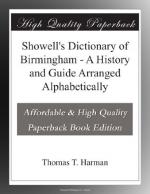Wyatt.—John Wyatt, one of Birmingham’s most ingenious sons, invented (in 1738) the spinning of cotton by means of rollers, but unlike Richard Arkwright, who afterwards introduced a more perfect machine and made a fortune, the process was never other than a source of loss to the original inventor and his partners, who vainly tried to make it a staple manufacture of the town. The weighing machine was also the work of Wyatt’s brain, though he did not live to see the machine in use, dying Nov. 29, 1766, broken down by misfortune, but honoured by such men as Baskerville and Boulton who, then rising themselves, knew the worth of the man whose loss they deplored. Wyatt’s grave is on the Blue Coat School side of St. Philip’s churchyard.
Wyon.—A celebrated local family of die-sinkers and medalists. William Wyon (born in 1795) receiving the gold medal of the Society of Arts, for his medal of Ceres, obtained in 1816 the post of second engraver at the Mint, his cousin, Thomas Wyon, being then the chief. One of the finest medals engraved by him was that of Boulton, struck by Thomason, in high relief, and 4in. in diameter. He died in 1851, having produced all the coins and medals for Queen Victoria and William IV., part of George IV.’s, and prize medals for many societies. His son, Leonard Wyon, produced the Exhibition medals in 1851.
The preceding are really but a few of the men of note whose connection with Birmingham has been of historical interest, and the catalogue might be extended to great length with the names of the De Birminghams, the Smalbrokes, Middlemores, Colmores, and others of the old families alone. Scores of pages would not suffice to give even the shortest biographies of the many who, by their inventive genius and persistent labour, placed our town at the head of the world’s workshops, the assistants and followers of the great men of Soho, the Thomasons, Taylors, and others living in the early part of the century, or the Elkingtons, Chances, &c., of later days. A volume might easily be filled with lives of scientific and literary men of the past, Hutton the historian, Morfitt, poet and barrister; Beilby, Hodgetts, Hudson, and other bookmen, to say naught of the many Press writers (who in their day added not a little to the advancement of their fellow-townsmen), or the venerable doctors, the school teachers and scholars, the pastors and masters of the old School and the old Hospital. Mention is made of a few here and there in this book; of others there have been special histories published, and, perchance some day “Birmingham men” will form the title of a more comprehensive work.
Novel Sight.—The appearance in the streets of Birmingham of a real war vessel would be a wonderful thing even in these days of railways and steam. Sir Rowland Hill, speaking of his childhood’s days, said he could recollect once during the war with Napoleon that a French gunboat was dragged across the country, and shown in Birmingham at a small charge. He had never then seen any vessel bigger than a coal barge, but this was a real ship, with real anchor and real ship guns.




